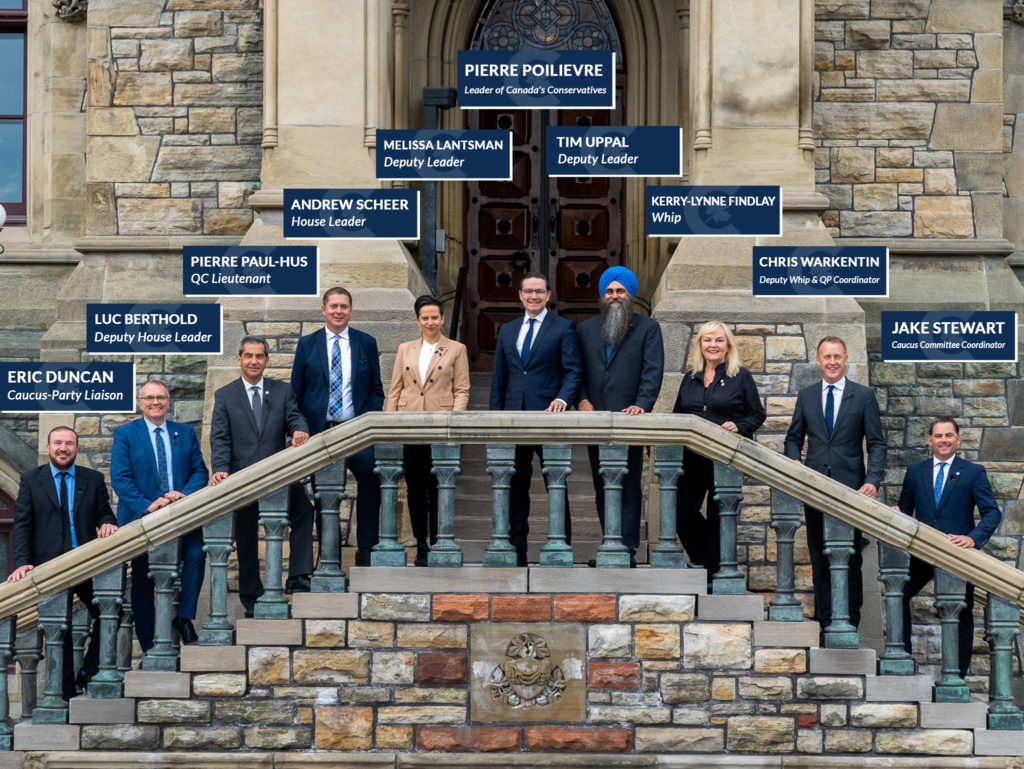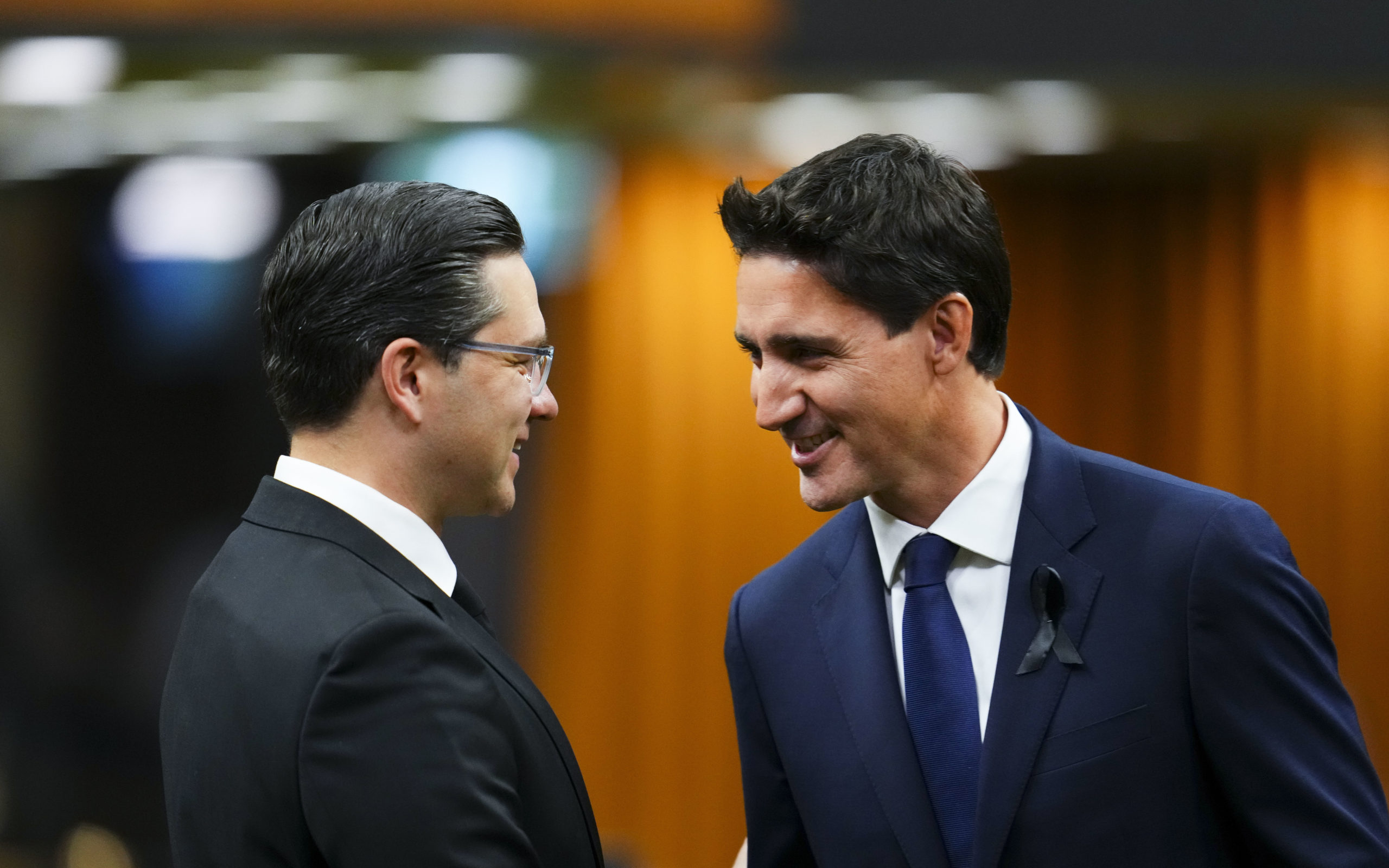The House of Commons and the Senate resume sitting today, following the summer adjournment. With the recent election of Pierre Poilievre as Conservative leader, the fall parliamentary sitting will see a new face in the opposition leader’s chair, and a government trying to get on top of a summer of inflation and increases to the cost-of-living for Canadians.
Poilievre takes the opposition reins
On September 10th, Pierre Poilievre won the Conservative Party leadership in a decisive victory and, given the fact he already had a seat in the Commons, instantly also became leader of the opposition. Our team prepared this analysis of Poilievre’s win following the release of the leadership race results.
Mr. Poilievre has already announced his new party leadership team, including MPs Melissa Lantsman (Thornhill) and Tim Uppal (Edmonton Mill Woods) as new deputy leaders, and former party leader Andrew Scheer (Regina—Qu’Appelle) as House Leader.

Poilievre’s next item of business will be the selection of his shadow cabinet to challenge the Trudeau government in the House this fall. While no date has been set for the release of the new Conservative front-bench team, it’s expected a revamped shadow cabinet will be announced shortly after the Canadian Thanksgiving holiday.
Recent federal polling
Most polls released over the summer have reported the Liberals and Conservatives in a virtual tie or trading the lead back and forth within narrow margins.
A new poll completed after the election of Pierre Poilievre as Conservative leader, shows the Conservatives leading the Liberals by 35 per cent to 30 per cent, with the NDP at 17 per cent, the BQ at 9 per cent, and the People’s Party and the Greens both at 4 per cent.
Notably, the federal Conservatives are now polling ahead of the Liberals in Ontario, by 38 per cent to 34 per cent, while dissatisfaction with the Liberals’ performance nationally stands at 49 per cent. Early polling and anecdotal observation of public reaction to Pierre Poilievre suggest he is polarizing in voters’ response to him – similarly to PM Justin Trudeau.
Policy developments over the summer

House of Commons Committees: Despite the summer parliamentary break, between mid-July and early September seven different House of Commons committees were hard at work holding a total of 21 meetings on a variety of subjects. Issues before these House committees included airport delays, Hockey Canada’s (mis)handling of sexual misconduct, the July Rogers service outage, the federal decision to return a Russian pipeline turbine to Germany, and allegations of political interference in the investigation of the 2020 mass shooting in Nova Scotia.
Airports: The troubles at major Canadian airports appear to have eased somewhat over the summer, with fewer flight delays and cancellations, and shorter security clearance and baggage wait times being reported, but there’s still lots of room for improvement. By late August, the flight tracking service FlightAware reported that Toronto’s Pearson airport, which had the most flight delays in the world for most of the summer, had only moved into second place as the world’s most subject to delays. Since May, more than 7,000 disgruntled travellers have flooded the Canadian Transportation Agency (CTA) with complaints related to flight disruptions. Travellers continue to report serious air travel delays and frustration resulting from the still mandatory ArriveCan app.
Passports: Minister of Families, Children and Social Development Karina Gould was in the hot seat for most of the summer, dealing with persistent delays in Canadian passport approvals. In mid-August, the minister indicated line-ups and wait times were reducing after the government hired 500 new staff, extended passport office hours, and prioritized applicants with imminent travel plans. Earlier, the government also expanded passport pick-up services, adding five more locations in Ontario, Quebec, Alberta and B.C. to the 29 pre-existing passport offices.
International student visas: With Canadian universities and colleges back in business for the fall term, the latest challenge for the government is a huge backlog in processing visas for thousands of international students coming to Canada to study. As of the end of July, 34 per cent of pending visas were taking longer to process than government standards require. The Indian High Commission in Canada as well as many Canadian universities have expressed concerns that the delays are creating uncertainty for many students who have paid thousands of dollars in tuition and cannot formally register for their study programs.
Government priorities
Inflation and the cost of living: As measured by the consumer price index (CPI), inflation increased by 7 per cent in August over the previous year, and slightly down from 7.6 per cent in July. While gasoline and house prices have eased, costs for food and business services continue to increase. Global inflation remains high, and measures of core inflation are moving up in most countries.
In its continuing efforts to fight inflation, the Bank of Canada responded with two interest rate increases over the summer, by 1 per cent on July 13 and a further 75 basis points on September 7. The “Financial Wellbeing Index Canada: Summer 2022”, published on September 7 by LifeWorks, an international human resources consultancy, found that “nearly one-third of working Canadians are concerned about their ability to cover basic living expenses.”
The government’s response: After a summer of taking heat about its lack of response to the rising cost of living, last week the prime minister announced three new measures to address affordability for Canadians and meet the agreed commitments of his government’s Supply and Confidence Agreement with the NDP:
- The Goods and Services Tax Credit (GSTC) will be doubled for six months. Single Canadians without children will receive up to an extra $234 and couples with two children will receive up to an extra $467 this year. Seniors will receive an extra $225 on average.
- Starting this year, the government will provide a Canada Dental Benefit to children under 12 who do not have access to dental insurance. The program will provide direct payments totalling up to $1,300 per child over the next two years (up to $650 per year) for dental care services. This is the first stage of the government’s plan to deliver dental coverage for families with income under $90,000 and will allow children under 12 to get required dental care while the government is developing a comprehensive national dental care program.
- Ottawa will provide a $500 one-time increase to the Canada Housing Benefit for renters who pay at least 30 per cent of their income on rent and earn less than $20,000 as individuals or less than $35,000 for families.
The estimated total cost of the support package is more than $4.5 billion, of which $1.4 billion was included in the 2022 budget. While some economists have claimed another $3.4 billion in new spending will only add fuel to the fires of inflation and further interest rate hikes, other experts point out that the increased spending is equal to just .1 per cent of the Canadian economy, that the spending is tightly targeted through means-testing to those people most in need, and that it will not add to inflationary demand.
Legislative activity
Bills to implement the GST change, the dental benefit and the increase to the housing benefit are all slated to be introduced in the House of Commons today.
In our end of sitting summary published at the beginning of the summer, we outlined several key pieces of legislation that would be awaiting MPs and Senators when they return to Ottawa this fall:
- C-11, the Broadcasting Act: this re-tabled bill proposes to amend Canada’s broadcasting framework to include the regulation of online streaming service providers and social media platforms.
- C-21 on Firearms: part of the government’s strategy to address gun violence and strengthen gun control in Canada.
- C-22, the Canada Disability Benefit Act: provides for the introduction of a monthly benefit payment working-age Canadians with disabilities.
- Bill C-26, An Act Respecting Cybersecurity: “enacts the Critical Cyber Systems Protection Act to provide a framework for the protection of the critical cyber systems of services and systems that are vital to national security and public safety,” within federal jurisdiction.
- Bill C-27, Digital Charter Implementation Act, 2022: which modernizes the collection, use and disclosure of personal information, and would regulate international and interprovincial trade and commerce in artificial intelligence systems.
- Bill S-5, the Strengthening Environmental Protections for a Healthier Canada Act: a long-awaited bill to modernize the Canadian Environmental Protection Act, which has not been updated in over two decades, will make its way to the House from the Senate.
- Still to come is a revised online harms bill. An earlier legislative draft was withdrawn amid vocal criticisms from all sides, sending the government back to the drawing board.
The weeks ahead
With the start of the fall sitting delayed by one day for the official day of mourning for Her Late Majesty Queen Elizabeth II, the House of Commons meets today, beginning a three week stretch, before breaking for the Thanksgiving weekend and following week. It will then be an action-packed fall, with only one break week scheduled between Thanksgiving week and the end of the sitting in mid-December.
In the 11 weeks of business ahead, the government will need to address several priorities, including presumably the release of a Fall Economic Statement, and progress on key pieces of legislation, as outlined earlier. The release date for the Fall Economic Statement has not yet been announced, but should be expected some time in October, likely after the Thanksgiving holiday. As a separate initiative, the House of Commons Standing Committee on Finance is conducting a pre-budget consultation, which closes for submissions on October 8th.
Upcoming events
- PM in New York for UN General Assembly this week
- Public Order Emergency Commission will meet to assess the use of the Emergencies Act this past spring, exact date TBA
- Quebec provincial election: October 3
- Alberta United Conservative Party of Alberta leadership election: October 6
- Deadline for Standing Committee on Finance stakeholder submissions in advance of federal Budget 2023: October 8
- COP 27, the 2022 United Nations Climate Change Conference in Egypt: November 6-18
- COP 15, the United Nations Convention on Biological Diversity will be held in Montreal, December 7 – 19
